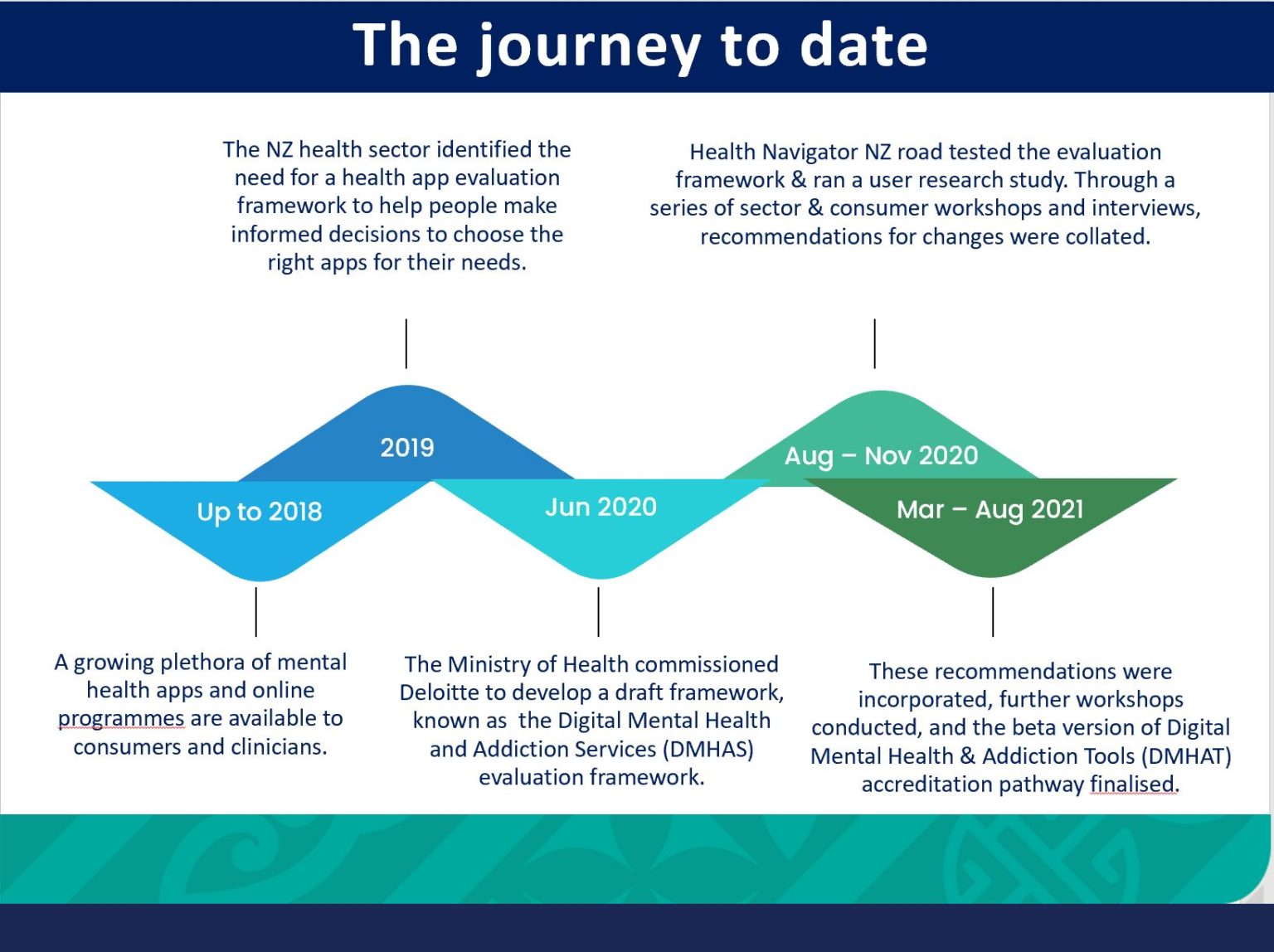ABOUT DMHAT
New Zealand Aotearoa’s eMental Health Journey
E-Mental Health and its relationship to DMHAT
The use of trusted e-mental Health solutions (such as apps and online programmes) has increasingly been accepted world-wide as a realistic option for augmenting traditional mental healthcare services and improving access to psychological interventions and mental health care.
The uptake of these solutions has further been accelerated by the COVID-19 pandemic, which has highlighted how digital approaches can offer some level of care where access to in-person services is precluded.
With this rapid adoption of e-mental health apps, online self-help and digital programmes, how does any system ensure those solutions are safe, effective and enable trust between prescribers and users? The Digital Mental Health and Addiction Tool (DMHAT) Assessment Framework is the New Zealand Ministry of Health’s initial step to ensure that e-mental health solutions are safe, appropriate and effective.
As use and functionality of e-mental health solutions continue to expand, so too will the DMHAT assessment framework evolve and adapt.

Whakapapa of NZ e-Mental Health Assessment Framework
The assessment journey began in 2019 when Robyn Shearer, Deputy Director General of the Ministry of Health's Mental Health and Addiction Directorate, commissioned the development of a framework for e-mental health and addiction in New Zealand. This was in response to the New Zealand mental health sector identifying the need for a framework to help people make informed decisions to choose the right apps for their needs.
Te Pou o te Whakaaro Nui (Te Pou) in collaboration with HealthTRx began the development of a framework with a focus on practical tools and a roadmap for further, more detailed, work that included:
- A workshop with representatives from the Ministry of Health, Te Pou and HealthTRx defined the initial scope of, and plan for, the framework’s development.
- Consultation with representatives of key stakeholder groups based on the plan and review of work in other countries. This mahi included a consumer and peer roles focus group, and the Te Pou and Werry Workforce Whāraurau clinical sector reference group. An online survey was also undertaken that was targeted to peer and whānau roles, health professionals, academia, service providers, developers and international experts.
- In 2020, the Ministry of Health commissioned Deloitte to develop a draft framework, known as the Digital Mental Health and Addiction Services (DMHAS) evaluation framework.
- The Ministry of Health invited Health Navigator NZ to run a user research study and road test the DMHAS framework. Through a series of sector and consumer workshops and interviews recommendations for changes were made.
- In 2021, the recommendations were incorporated into DMHAS, further workshops were conducted, and the beta version of the resultant Digital Mental Health & Addiction Tools (DMHAT) assessment and accreditation pathway finalised.
Our Kaituki – the people behind DMHAT
This important mahi has developed over the last two years with invaluable input from numerous whānau, health consumers, clinicians, developers, researchers, e-mental health and IT experts. The project is now led by the Health Navigator NZ team, which established the New Zealand Health App Library in 2016, in partnership with the Ministry of Health Mental Health Directorate, sector experts and whānau with lived experience through the Health Consumer Advisory Service and other broad community networks.
The Health Navigator NZ team would like to express its gratitude and thanks to the ORCHA team for their generosity and expert guidance in developing this latest version of the DMHAT assessment framework. We also wish to thank the many subject matter experts, consumers, advisors, clinicians, researchers and developers who have contributed so much through workshops, interviews, discussions and hui to this important mahi over the last 12 months.
You can read more about the Health Navigator NZ team and the Health Consumer Advisory Service.

Next steps
As at late 2021, the DMHAT Assessment Framework is available as a beta version and consists of the self-assessment process and the DMHAT Collaborative (in development).
Once funding is confirmed, the collaborative, which will include discussion forums for members, will enable the digital community, and those interested in in it, to be part of the mahi and journey to continue developing, refining and improving the criteria, scoring and processes within the framework.
In addition, the implementation of a DMHAT Accreditation Pathway – similar to a warrant of fitness – has been identified as an important potential key enabler for transformation of service delivery within New Zealand’s mental health and addiction system.
Akin to the Social Services accreditation process, Te Kāhui Kāhu, this would add significant value to the sector by providing assurance that digital tools and online programmes can safely deliver e-mental health support and e-therapy for our communities.
Formal accreditation would put in place a check for digital tools to ensure key safety, usability, relevance, cultural safety, technical security, privacy and data sovereignty standards have been met. Accreditation would also support safer, faster procurement and commissioning of trustworthy, reliable e-mental health solutions.
There is much mahi to be done and we invite you to get involved and join us on this exciting journey.
